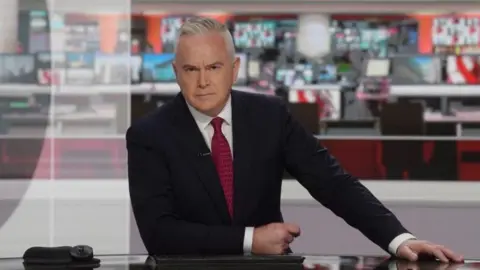
 BBC
BBC
The BBC has begun to remove Huw Edwards from some of its archive footage after the former broadcaster pleaded guilty to making indecent images of children.
It is starting with family and entertainment content on iPlayer, according to the Observer which first reported on the move.
Until last year, Edwards was one of the main presenters on BBC One’s News at Ten and often fronted coverage of major national events.
“As you would expect we are actively considering the availability of our archive,” a BBC spokesperson said.
“While we don’t routinely delete content from the BBC archive as it is a matter of historical record, we do consider the continued use and re-use of material on a case-by-case basis.”
Edwards resigned from the BBC in April citing medical advice. On Wednesday, he admitted having 41 indecent images of children, which had been sent to him by another man on WhatsApp.
The Observer claimed that the removal of certain content was aimed at “protecting audiences from repeats of Edwards’ most visible work in news and on state occasions”, including the funeral of Queen Elizabeth II.
A Doctor Who episode featuring Edwards’ voice has already been removed from iPlayer.
The episode from 2006 features David Tennant and Billie Piper as the Doctor and his companion Rose Tyler. The pair travel to the future to the London 2012 Olympics where Edwards’ voice is heard as part of a televised BBC news report.
A mural of the former newsreader in the presenter’s home village of Llangennech, Carmarthenshire has also been removed.
Artist Steve Jenkins, 50, painted over the portrait on Tuesday after it was announced Edwards had been charged.
Cardiff council has also removed a plaque honouring Edwards at Cardiff Castle.
BBC pays for woman’s therapy
In a separate development, The Sunday Times has revealed that a woman who complained to the BBC about Edwards twice is having therapy paid for by the corporation.
The newspaper says the woman, a member of the public called Rachel, struck up a friendship with Huw Edwards in 2018 over social media.
In 2021, Rachel complained about Edwards, alleging the relationship was becoming “toxic”. She complained about him again the following year.
She retracted both her complaints. Nevertheless, the newspaper reports that the BBC warned Edwards about his behaviour and told him to stop contacting her, but he did not.
After an investigation into its handling of Rachel’s complaints, the BBC admitted shortcomings in its processes. It is still paying for Rachel’s therapy.
A BBC Spokesperson said: “If a complaint is made, or concern raised, about how the BBC handles such a complaint then we always investigate thoroughly, provide support to those involved and be as transparent as possible in relation to our work, findings and any resolution.”
It has also emerged that the BBC board, which oversees the running of the corporation, has asked executives for two briefing papers covering their response to Edwards’ arrest in November and the internal disciplinary process he faced.








